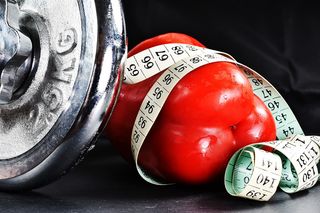Stress
Practical Strategies to Help You Lose Weight and Keep It Off
Want to get to a healthy weight? It'll take more than counting calories.
Posted March 16, 2019 Reviewed by Kaja Perina

Do you struggle to lose weight, and then struggle more to keep it from piling back on? This seemingly endless cycle is not only stressful, but also demoralizing.
Years ago, I obtained my undergraduate degree in Dietetics (nutrition) before moving on to study medicine. Back then, we thought weight management was based on a simple linear relationship of calories in versus calories out. Eat more than you burn off, and you’ll gain weight. Vice versa to lose weight.
There’s still some basic truth to that formula. Most of us have gained weight after eating too much over Christmas or on vacation, and we lose weight when we restrict our intake. Still, the entire equation is much more complex. We don’t understand it fully. In fact, the more we learn about metabolism and obesity, the more confusing and contradictory things may seem. There are some things that we do know, though, that it will help you to be aware of if you're struggling to get to a healthier weight.
I’ve attended the Lifestyle Medicine: Tools for Healthy Change course at Harvard Medical School a number of times now, learning from leaders in the field of obesity and metabolism. I’ll share with you key concepts I’ve picked up, as well as what I’ve learned from personal experience and my work as a coach and medical doctor.
1. Be prepared: When you lose weight, you trigger a cycle that makes you more hungry.
This sounds depressing, and it is. Still, it’s important to be aware of it, as it will help you to be psychologically prepared. Fat cells are metabolically active and secrete a hormone called leptin. Leptin signals the brain that you have enough fat stores. This causes you to feel less hungry.
When you lose weight, you lose fat cells and produce less leptin. As a result, you’ll feel hungrier than you did before. This is your body’s way of defending a higher body fat set point.
I have experienced this phenomenon, and it makes me mad. I don’t want to give in to that higher set point as my new normal, though, especially if the extra weight had crept up on me because of careless choices (way too much movie popcorn last year, for example).
So, be aware that if you’ve lost weight, hunger and satiety may not be reliable cues for how much you should actually be eating.
2. Choose whole foods: Our food supply is radically different than it used to be and sets you up to fail.
We’re only beginning to understand the impact of all the sugar, unhealthy fats, and processed foods that fill grocery store shelves and restaurants. All that bad chemistry has a bad effect on our minds and bodies.
Stay away from addictive foods, the ones you can’t stop eating once you’ve had a taste. Years ago I learned that if I want to meet my health and weight goals, there are certain foods I can’t have at home. Cookies. Popcorn. Cake. Chocolate. I can’t resist them. These days, I don’t let myself create situations where I’ll fail.
It’s much safer to eat whole foods. Now, if I’m hungry and crave something sweet, I’ll have an orange or an apple. Boring, I know, but it works. They satisfy the craving, but are hardly binge-worthy. I’ve never eaten more apples or oranges than I originally intended. Have you?
3. Move a lot: After you lose weight, you may need to exercise more.
When you lose weight, your resting metabolism will probably slow down (ugh, how is this fair?). Since muscle mass boosts metabolism, you can help to balance this effect by lifting weights and building muscle. This will also help to prevent losing muscle while you’re losing weight.
You can also exercise a bit more than you did before you lost weight to counteract the slowed metabolism. I know this seems ridiculously unfair, but it will help. Thankfully, exercise has so many amazing side effects, from a better mood to the decreased experience of stress. Exercising more will probably make you feel better than you already did.
A side note: Most of us tend to relax when we’ve reached a weight loss goal (I know I do), and that will often lead to being less careful about what we eat and less motivation to exercise. Since the body is actively trying to gain all that fat back, the correct response is vigilance. We actually need to be more careful once we’ve reached our goal. The good news is that this seems to get easier with time. When you build healthy habits, they become habits and require much less thought and effort.
4. Think before you reach: Watch out for snacking, and identify your eating triggers.
Apparently, we snack at least one more time a day than we used to in the past. On average, we get a quarter of our daily calories from snacks. Yikes! This can really add up.
Do you snack during the day (or at night), because you’re actually hungry? Or is it because you’re bored, tired, need a break, or just like the feeling of eating while watching Netflix? It’s really important to be aware of this.
So many of us use food for purposes other than nutrition. We use it for comfort, to relieve stress, to reward ourselves, to celebrate, to entertain ourselves. If you want to maintain a lifelong healthy weight, that perspective on food needs to change. When you find yourself wanting to reach for a snack, get in the habit of checking your mood and motivation. Much of the time, it’s not food you actually want. It’s a feeling. Find other ways to achieve that positive feeling. This really works.
5. Less is more: Limit the variety of food choices available to you.
It’s important to understand the psychology of food and eating. Unexpected factors may hijack our decisions, despite our best intentions. For example, the more food options you have available, the more you’ll eat. Isn’t that crazy? Good to know, though.
Keep your choices simple at home. Don’t have a snack cupboard with dozens of different tempting options on hand. Keep simple, healthy food choices in your fridge, and not too many different types.
The novelty will also cause us to automatically eat more. Part of why I gained weight when my husband and I got married is because I was trying new recipes all the time. I loved the new tastes and often took second and even third helpings. Oops!
6. Set yourself up to succeed: Get enough sleep.
If you’re sleep deprived, leptin production gets suppressed (recall that leptin is the hormone that promotes satiety), and you produce more of another hormone, ghrelin. Ghrelin stimulates appetite and also makes you crave higher fat and sugar foods.
Getting enough sleep (at least seven hours for most people) will go a long way toward giving yourself a biochemical advantage. Not only will you automatically feel more full and have fewer cravings, but you’ll also handle stress better. You’ll be less likely to fall into “stress eating.” Finally, adequate sleep gives you the advantage of lower, more stable blood sugar and better insulin function.
7. Give yourself a fighting chance: Avoid alcohol.
I’ve had a love/hate relationship with alcohol for a while. I have times when I avoid it, and times when I enjoy and celebrate it. Sadly, after every season of enjoying it—even just a few drinks a week—my weight inevitably creeps up, and my pants get uncomfortably tight. This is for a number of reasons:
- Though wine can go down like water, it’s not—there are 80 calories in a glass.
- Alcohol reduces inhibitions, and I’m quick to forget my best intentions and go into “party mode” (party = enjoy in excess any food I can find).
- Alcohol very likely stimulates the brain to increase appetite (see “party mode”).
- Alcohol promotes belly fat, hence the term “beer belly.” That’s a real thing.
Since I’ve been fighting a higher body fat set point for a few years now, I’ve decided again—sadly—that wine and I just can’t hang out that much anymore.
8. Take care of yourself: Minimize stress in any way you can.
If stress plays a big role in your food choices, this strategy might be the best place to start.
What’s the most stressful aspect of your life, and how might you make it better?
Maybe you need to give yourself enough time to get places. Don’t take on more than you can handle. Let things go that just aren't worth the trouble.
Learn to use stress management strategies that don’t involve food. I used to deal with stress by eating way too many cookies. Now, I deal with stress through the following tools: a daily relaxation practice; praying; journaling; talking to wise friends; taking a brisk walk if I’m upset; 4-6-8 breathing (and that’s just the short list).
Now, personalize all this for yourself.
I encourage you to re-read the eight different strategies that I've covered in this article and reflect on how they may be true for you. Which do you feel would be most impactful for you to be aware of?
Losing weight and keeping it off is tough. It can even feel cruel, the way that the decks may be stacked against you. Don’t lose heart. You can definitely make choices that will make a difference to your success.
Of course, every situation is unique, and this article isn’t meant to be medical advice: I encourage you to enlist the help of qualified professionals in your health journey.
Copyright 2019 Dr. Susan Biali Haas
Facebook image: michaeljung/Shutterstock




